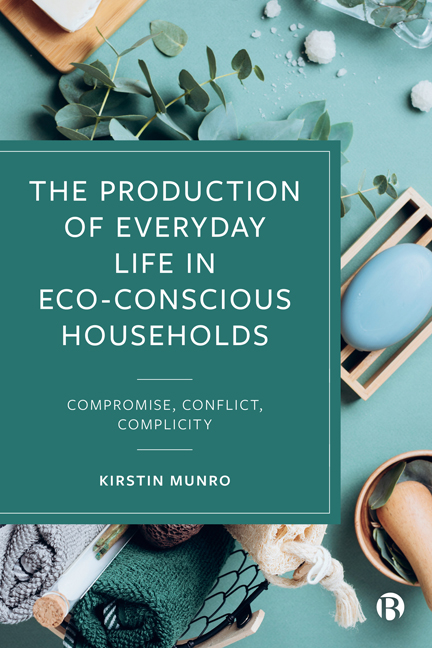Book contents
- Frontmatter
- Dedication
- Contents
- Acknowledgments
- 1 Introduction: “This Can’t Be All Up to Me”
- 2 Eco-Conscious Household Production and Capitalist Society
- 3 Priorities in Eco-Conscious Households
- 4 Resources and Constraints in Eco-Conscious Households
- 5 Managing Household Waste
- 6 Cleanliness and Comfort
- 7 Doing Their Own Research
- 8 Conflict
- 9 “How Do We Live with Ourselves?”
- 10 Conclusion: “We Have Met the Enemy and He Is Us”
- Notes
- Index
5 - Managing Household Waste
Published online by Cambridge University Press: 18 January 2024
- Frontmatter
- Dedication
- Contents
- Acknowledgments
- 1 Introduction: “This Can’t Be All Up to Me”
- 2 Eco-Conscious Household Production and Capitalist Society
- 3 Priorities in Eco-Conscious Households
- 4 Resources and Constraints in Eco-Conscious Households
- 5 Managing Household Waste
- 6 Cleanliness and Comfort
- 7 Doing Their Own Research
- 8 Conflict
- 9 “How Do We Live with Ourselves?”
- 10 Conclusion: “We Have Met the Enemy and He Is Us”
- Notes
- Index
Summary
In Chapters 3 and 4, I described my sample of eco-conscious households and the priorities, resources, and constraints that influence how they get things done in everyday life. In this chapter and Chapter 6, I will describe how these elements combine to generate a set of human activities in households that constitute everyday life. In trying to learn about how households get things done, I focused my conversations with informants on their practices with respect to six categories of daily life: waste, comfort, cleanliness, food, transportation, childcare, and general provisioning. The discussion in this book focuses on waste, indoor comfort, and cleanliness, since these are aspects of everyday life that have not received extensive attention elsewhere. Because of my interest in how practices change or are resistant to change, I asked follow-up questions to help me understand how my informants learned these practices, how these differ from the way they themselves grew up, how things have changed since becoming a parent, and what they would do differently if they had more time or money. This chapter describes how my informants deal with household solid waste.
Household waste includes trash and “packaging,” compost, recycling, diapers, and toilet waste. The eco-conscious households I spoke with were almost universally concerned with reducing their consumption, and for many, the waste generated by their lifestyles and practices serves as an uncomfortable reminder of their shortcomings in the sustainability realm. For some households, practices that prevented waste from going to a landfill, such as composting and recycling, are sufficient to alleviate the guilt associated with waste-generating consumption. Other households attempt to purchase items with as little packaging as possible because recycling and composting are not enough for them to feel absolved. Waste is visible, tangible evidence of things you consumed. Once every week or two, your neighbors can see all of your trash awaiting removal right in front of your home. It smells, it is unsightly, it attracts vermin, and it triggers disgust through our instinctive drive to avoid risks of contamination, parasites, and disease (Kelly 2011, 1– 58). In this sample of households, the topic of packaging—things like plastic films and cardboard boxes—elicited powerful and unexpected reactions from my informants, while practices that involve allowing organic matter to decompose in the backyard or leaving urine in a toilet bowl unflushed elicited few negative reactions.
- Type
- Chapter
- Information
- The Production of Everyday Life in Eco-Conscious HouseholdsCompromise, Conflict, Complicity, pp. 79 - 95Publisher: Bristol University PressPrint publication year: 2023



